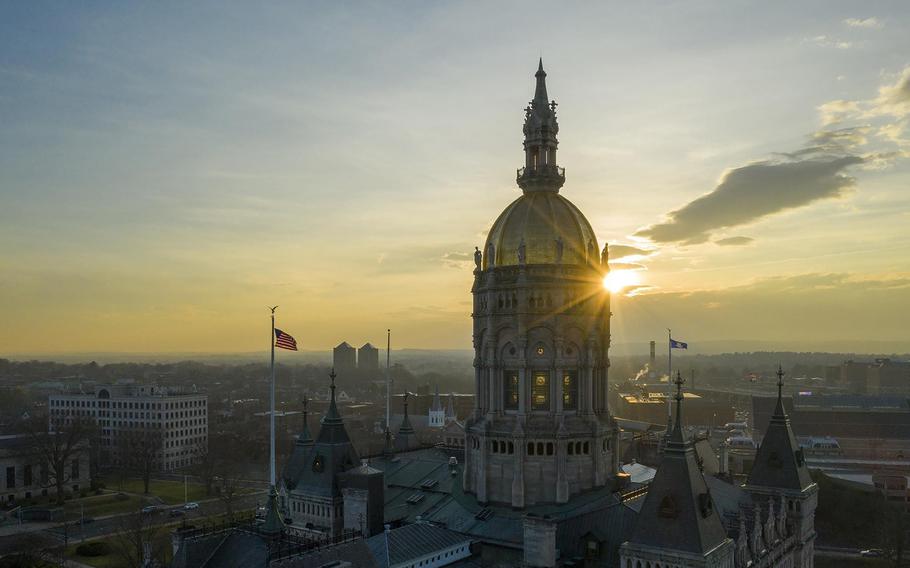
The Capitol of Connecticut in Hartford. State senators unanimously voted to outlaw child marriage Friday, June 2, 2023, making Connecticut one of the last states in the region to ban the practice. (Mark Mirko, Hartford Courant/TNS)
HARTFORD, Conn. (Tribune News Service) — State senators unanimously voted to outlaw child marriage Friday, making Connecticut one of the last states in the region to ban the practice.
The legislation, which closes loopholes that currently allow probate judges to issue marriage licenses to 16- and 17-year-olds with the written consent of a parent or guardian, now heads to Gov. Ned Lamont, who said that he will sign the proposal into law.
“This means they get to be kids,” Jenn Bradbury, a child marriage survivor, said through tears in the gallery after the final vote was announced. “They get to grow up and they get to figure out who they are, and then they can choose the rest of their life — but no one has to choose for them.”
Bradbury was 16 years old when her mother forced Bradbury to marry her abuser, a 44-year-old family friend who had groomed Bradbury since she was 14.
On Friday Bradbury was one of several women from the national nonprofit Unchained At Last who descended on the Capitol in wedding gowns and shackles to urge passage of the ban.
Between 2000 and 2021, Connecticut recorded 1,251 child marriages, according to marriage certificate data from the Connecticut Department of Health that was reported by Unchained At Last. Approximately 83% of those unions were between girls and adult men.
Before 2017, Connecticut had no age requirement for marriage. Its statutes technically allowed any minor of any age to marry with judicial approval.
In the six years since the legislature raised the minimum marriage age to 16, 30 girls and 3 boys have married in the state, according to testimony from Lamont’s Chief of Staff Jonny Dach.
The Senate’s overwhelming support for the child marriage ban was in sharp contrast to the House, which saw 45 Democrats and Republicans vote against the proposal.
In the House’s May 3 debate, the ban faced opposition from lawmakers who were concerned that raising the marriage age to 18 would strip rights from emancipated minors and discriminate against cultures and religions that permit child marriage. Others felt that pregnant couples should have a right to marry and that the provisions in current statute are an adequate safeguard against coercive marriage.
Fraidy Reiss, the executive director of Unchained At Last who is also a forced marriage survivor, disagreed.
“We didn’t choose 18 because it’s a random number that sounded good to us. We didn’t choose 18 because we think you wake up on your 18th birthday with a newfound wisdom and maturity and the ability to make a lifelong decision. 18 is so crucial because that’s the age of adulthood,” Reiss said.
“It is so crucial that the age of marriage not be before the age of adulthood. Because right now we’re entering minors into a marriage before they have the rights that they need to navigate a contract as serious as marriage,” Reiss added. “(18 is) the age you can open the front door and escape if you want to get out of your marriage. That’s the age you can get into a domestic violence shelter. That’s the age you can retain an attorney because you can enter into a contract. That’s the age you can bring legal action, including a divorce.”
After the passage of the ban, Bradbury cried with joy and relief knowing that no girl in Connecticut would face the kind of trauma that she endured.
“I got pregnant the fall of my junior year. I was in an emergency room alone, having a procedure to save my life from the ectopic pregnancy that I’d been subjected to. After that, my mother decided that I had made my bed and I should lie in it. So she threatened my abuser with exposure and took us to the courthouse to get married. It took 10 minutes to get the certificate,” Bradbury said, recalling her marriage in Florida at the age of 16.
“Somewhere along the way I got a phone call and my baby sister said to me, ‘Jenny, I have to tell you something. Please don’t hate me.’ She said, ‘You weren’t the only one. The whole time he was molesting me too.’ And it broke me because I thought I was mature. I thought I found love. I thought I was special. And I was just another little girl in a string of little girls for this predator,” Bradbury said.
As a child bride, Bradbury was forced to drop out of high school. She became pregnant five times and birthed two children. She said she attempted suicide multiple times and even contemplated killing her husband.
Bradbury finally escaped her abusive marriage by joining the Navy in secret when her youngest child was just 8 months old.
Bradbury said the military gave her “a chance at life.” She got her GED, went to college, earned a degree in accounting, and is now studying to become an attorney at the University of Massachusetts School of Law on a full ride.
Bradbury said she plans to use her degree to help others escape their forced marriages.
“People’s silence kept me trapped for years and I refuse to be silent anymore,” Bradbury said. “I’m not embarrassed. I’m not ashamed. I am proud of what I’ve come, what I’ve come through. I’m proud of what I am today. It didn’t need to happen. It doesn’t need to happen to anybody else.”
©2023 Hartford Courant.
Visit at courant.com.
Distributed by Tribune Content Agency, LLC.